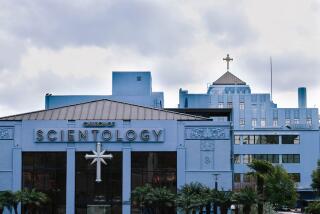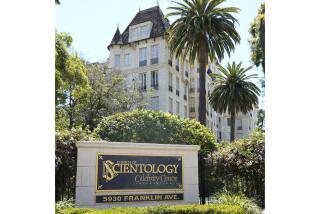Tax-Free Status OKd for Church of Scientology
After decades of feuding, the Internal Revenue Service has granted the Church of Scientology and more than 150 of its corporate entities tax-exempt status, ruling that they are charitable, religious organizations entitled to be free from federal income taxes.
Marty Rathbun, president of one of the Scientology organizations that received the tax exemptions, said the government sent 30 exemption letters to Scientology groups earlier this month. All told, the exemptions apply to 153 corporate entities, said Rathbun, who is the president of the Religious Technology Center.
âWeâre extremely pleased with the tax exemptions,â Rathbun said, adding that because of them: âWe look forward to our greatest expansion ever.â
The exemptions were granted as part of a larger agreement between the IRS and Scientology. They are thought to be worth millions of dollars to Scientology, which requires fixed donations for its progression of courses aimed at unburdening parishioners of spiritually traumatic past experiences.
The ruling by the IRS means that church members may now deduct those costs on their tax returns, allowing Scientology to raise money more easily. At the same time, church organizations will be exempt from federal income tax.
The exemptions come after 40 years of extraordinarily bitter fighting between the IRS and Scientology, which at times grew so intense that Scientologyâs late founder, L. Ron Hubbard, incorporated his deep animosity toward the agency into the churchâs official teachings.
The government has long recognized Scientology as a religion. But it has consistently denied tax-exempt status to the myriad corporate entities that comprise the churchâs sprawling empire, contending that those organizations were operating primarily as businesses and that their money was being used for the private benefit of top Scientology leaders, including Hubbard.
With that contentious history as a backdrop, Scientologyâs top official, David Miscavige, called followers together last weekend at the Los Angeles Sports Arena to announce the milestone exemptions.
âThe war is over!â Miscavige proclaimed at the event, according to a document labeled âExecutive Directive No. 750â of the Religious Technology Center. âWe have brought to an end 40 years of suppression of Scientology and Scientologists. Any discrimination or biased or unfair treatment of Scientologists by the IRS is over. . . . Our road to infinite expansion is now wide open.â
IRS officials, although declining to respond to Miscavigeâs comments, confirmed that the service had issued approximately 30 tax-exemption letters to Scientology organizations on Oct. 1. Those letters, said IRS spokesman Frank Keith, settle a host of tax disputes between the federal government and the Scientology organization.
âBased on the information supplied, and assuming your operations will be as stated in your application for recognition of exemption, we have determined that you are exempt from federal income tax,â states one letter, addressed to the Church of Scientology International. A second letter, also sent to the Church of Scientology International, declares that all its subordinate organizations are exempt as well.
The exemptions are only part of a larger agreement between the IRS and the Scientology organizations, details of which government officials said they could not disclose. Dozens of federal cases involving the Church of Scientology and its various entities have been resolved under the agreement, according to government and church officials.
The Justice Departmentâs civil division was handling those cases for the government, but officials there declined comment Tuesday, referring all calls to the IRS. Although church officials are allowed to release details of that agreement, Rathbun said they would not.
âThatâs like asking for somebodyâs tax returns,â Rathbun said in response to a request for the information. âItâs just not something to be bandied about in the media.â
The application by the Scientology groups for tax-exempt status was the largest in the history of the IRS, filling a collection of files 10 to 12 feet long, according to an agency official.
Miscavige, the churchâs leader, did not respond to requests for an interview. Rathbun said Miscavige was resting after the 40-year fight with the IRS.
One of the most bitter clashes culminated in 1984 at the hands of the U.S. Tax Court. Siding with the IRS, it concluded in blistering language that the Church of Scientology of California had âmade a business out of selling religion,â had diverted millions of dollars to Hubbard and his family, and had âconspired for almost a decade to defraud the United States government by impeding the IRS.â
That ruling only affected a single Scientology organization, however, and various groups continued to contest IRS rulings ordering them to pay taxes. In some cases, they won their challenges, creating a mishmash of legal opinions that seemed destined for the U.S. Supreme Court.
The agreement between the IRS and the Church of Scientology appears to foreclose that possibility, however. Although some issues may fall outside the agreement, the tax battles are over, at least for now, officials on both sides of the dispute agreed.
âWe earned it,â Rathbun said. âWeâre entitled to it.â
From the late 1960s to the mid-1970s, IRS agents classified Scientology as a âtax resisterâ and âsubversive,â a characterization later deemed improper by a judge. For their part, overzealous Scientologists went so far in the 1970s as to bug an IRS office in Washington where the churchâs tax-exempt status was being discussed. That crime, among others, led to the imprisonment of 11 top Scientology leaders.
In later years, the IRSâs Los Angeles office launched a far-ranging criminal investigation into allegations by high-level Scientology defectors that Hubbard skimmed millions of dollars from the church. No charges were ever filed.
During that same period in the mid-1980s, Scientologists fought back by forming the National Coalition of IRS Whistleblowers, which helped fuel a 1989 congressional inquiry into alleged wrongdoing by the former chief of IRSâ Criminal Investigation Division in Los Angeles.
Practically from its inception in the 1950s, Scientology was accused by critics of being a high-pressure business masquerading as a religion to take advantage of government tax exemptions. Over the years, the organization became progressively more religious in its approach.
Originally, people who purchased Hubbardâs Scientology courses were called âstudents,â and his teachings were known as courses. Today, Scientology followers are known as âparishioners,â and teachings are described as sacred scriptures.
Hubbard told his followers that religion is âbasically a philosophic teaching designed to better the civilization into which it is taught. . . . A Scientologist has a better right to call himself a priest, a minister, a missionary, a doctor of divinity, a faith healer or a preacher than any other man who bears the insignia of religion of the Western World.â
More to Read
Sign up for Essential California
The most important California stories and recommendations in your inbox every morning.
You may occasionally receive promotional content from the Los Angeles Times.











